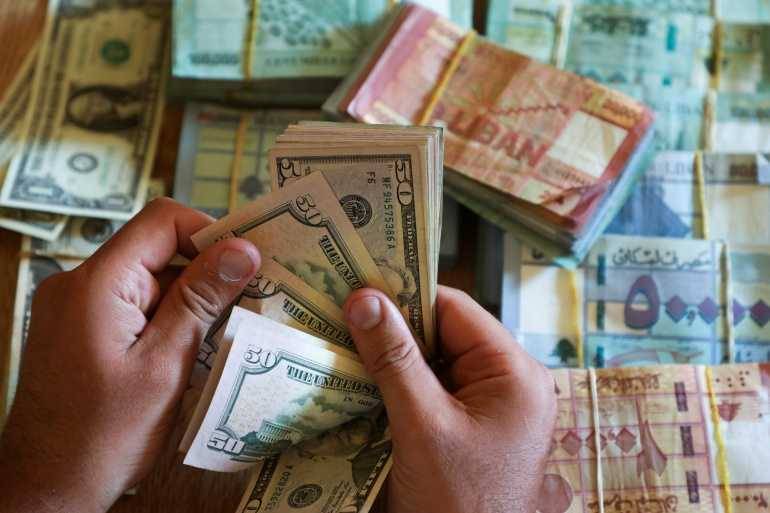Lebanon is experiencing pivotal and delicate days, marked by the complete transition from the 1500 lira rate to the new official rate of 15,000 lira, starting from February 1st. This transition will be accompanied by significant changes in the daily lives of the Lebanese, raising major questions about the fate of the exchange rate in the black market, as well as the fate of prices, deposits, loans, and many other daily life issues that concern people, with attention turning to the measures and circulars that will be issued by the Central Bank of Lebanon regarding all these anxieties.
These lines reflect what is significant to the Lebanese people, rather than the slogans raised in the name of constitutionalism or the rights of one sect or another. The country's crisis is much deeper than the search for the nature of angels or legal and constitutional debates over the legitimacy of convening a caretaker government, while all sectors are collapsing and the breakdown is all-encompassing at all levels.
Despite the objections issued, particularly from the Free Patriotic Movement and Bkerke, the Cabinet convened, focusing solely on the electricity file and approving the required advances, with preparations for a third session that Prime Minister Najib Mikati may call for next week. Notably, the presence of the ministers from the Marada Movement, as well as ministers Walid Nassar and Amin Salam, was significant, as it breached the front led by MP Gebran Bassil, alongside the presence of ministers from Hezbollah and the Amal Movement.
Ministerial sources indicated through Al-Anbaa electronic newspaper that it is inappropriate to leave the country in political turmoil and that it is erroneous to claim that the meeting of the resigned government infringes on the powers of the presidency. They called on "the political forces concerned with preserving the powers of the President of the Republic to go to Parliament and elect a president instead of accusing us as ministers who care for the interest of our country in these critical circumstances of usurping presidential powers."
In the context of positions recorded around the Cabinet session, MP Ahmad Khair, a member of the National Moderation Bloc, considered in an interview with Al-Anbaa electronic newspaper that the government meeting is a natural necessity toward the country and the people. He stated that according to the decisions issued following the session, the electricity file had been addressed, expecting the maintenance of the plants to be completed within 24 hours and electricity production to begin in less than 48 hours. He emphasized that this is the simplest duty of the state toward its citizens, regardless of the positions of the opposing forces regarding this meeting.
Khair pointed out that there are disagreements over assessments and important items, and in his view, all issues related to the daily lives of the people in these difficult circumstances necessitate the convening of the Cabinet. He described the positions issued by some Christian factions as a campaign of bidding against each other, stating that such bidding neither builds a country nor preserves institutions. He highlighted the government's role in addressing the situation, as they cannot lead citizens into a deeper crisis, urging everyone to prioritize the country's interests over their own personal interests, as the collapse of the structure will affect everyone.
Regarding the first presidential election session this year, Khair noted that the National Moderation Bloc will cast its vote as usual for "the new Lebanon," awaiting the Christian parties to reach a minimal agreement on a candidate capable of lifting the country from its predicament, provided they are open to dialogue and genuinely willing to complete the presidential process.
For his part, former MP Fadi El-Habr, in a call with Al-Anbaa electronic newspaper, viewed the electricity issue and improving supply hours as legitimate reasons for the Cabinet meeting, warning against wasting public funds related to the amount allocated for plant maintenance, as these funds are what remains from depositors' money. He stated that it is unwise to squander them in an atmosphere of distrust sweeping Lebanon, calling for a regularization of political life and the election of a president as soon as possible. He accused Hezbollah and the March 8 coalition of obstructing the presidential election, which could allow Hezbollah to tighten its hold over the country, urging the election of a distinguished sovereign president who believes in saving Lebanon in a modern way, restoring trust in Lebanon, and working towards mending relationships with Arab brothers and the world at large.
Everything will remain unchanged in today's session regarding the fate of the election and the arrival of a new president, except for the new names that might enter the competition, especially from the Free Patriotic Movement, amid information about the possibility of them reconsidering the decision to vote white this time as a message to their allies, pending the session and whether or not they will take this step.




